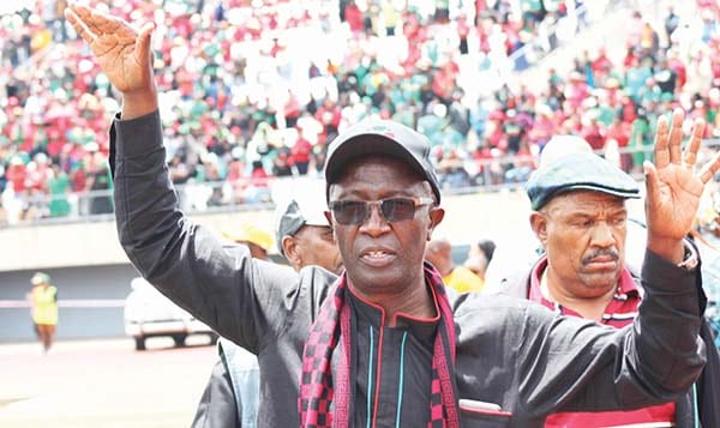Africa-Press – Lesotho. The Constitutional Court has ruled that government acted in accordance with constitutional provisions when it appointed foreign judges to sit on cases of high-profile members of different security agencies languishing in remand prison, dealing a heavy blow to former defence minister Ts’eliso Mokhosi and others.
The green light comes in the wake of Mokhosi, retired army commander Lieutenant General Tlali Kamoli, along with 14 other soldiers and police officers’ challenge of the appointment of Justice Charles Hungwe or any other foreign judges to hear their cases.
The court ruled that government has acted constitutionally in appointing the judges. While the government played the role of finding which jurisdiction the judges would come from, the Judicial Service Commission (JSC) was tasked with the decision on which appointments to recommend to the King.
The Court further held that by so doing, the Executive was fulfilling its mandate under Section 118 (3) of the Constitution to provide assistance to the courts to enable them to protect their “independence, dignity and effectiveness”.
Mokhosi and his co-applicants challenged the appointment of Justice Hungwe or any other foreign judges appointed to hear their criminal cases. They argued that the Executive played an active role in the recruitment of the judges and that the said judges were selectively picked to ensure that they (applicants) get the death penalty.
The involvement of government, especially that of Prime Minister Motsoahae Thabane, the Attorney General King’s Counsel Haae Phofoolo and Foreign Affairs minister Lesego Makgothi, had ‘tainted’ Justice Hungwe’s appointment, they further argued.
Government’s involvement they argued, had added to the body of evidence that should persuade the court that they would not receive a fair trial as government and its chief officers were interested parties in their cases.
“The involvement of the executive in the recruitment of the first respondent and any foreign judge to serve as acting judges of the High Court of Lesotho undermines the independence of the judiciary enshrined under section 118 of the Constitution buttressed by the provisions of the Administration of the Judiciary Act of 2011.
“We reasonably fear that the particular judges have been handpicked so that they could convict us and impose stiff penalties, including death penalty, given that it is still applicable in Lesotho,” Mokhosi said in the affidavit filed on behalf of all applicants.
All applicants, except Mokhosi, have been languishing in remand prison for almost two years without trial while government looked for foreign judges to preside over their cases.
The applicants are facing a litany of heinous crimes including murder, attempted murder, conspiracy to murder, theft and damage to property. KC Phoofolo in an affidavit said government merely discharged its constitutional obligation to ensure the effectiveness of the judiciary by requesting international assistance.
“The recruitment and appointment were done by the relevant authority and not the Prime Minister or under his control and supervision,” he said.
Phoofolo insisted the recruitment of the judges was left solely to the Judicial Service Commission (JSC) and that the appointment of Zimbabwean Justice Charles Hungwe was confirmed by His Majesty the King in terms of the Constitution without any interference from the Executive.
A multilateral agreement involving government, SADC, the Judicial Service Commission (JSC), the Director of Public Prosecutions (DDP) and European Union on the engagement of foreign judges attached to Phoofolo’s affidavit confirms the EU’s active involvement and pledge to fund the judges’ employment for 18 months.
The JSC, according to the agreement, was tasked with providing personnel and terms of reference for the judges. “The role of the executive was to trigger the recruitment process as it involves many factors such as securing the funding and engaging diplomatic negotiations with SADC and its member state.
“The recruitment process was left with and undertaken solely by the JSC through its usual and ordinary protocols, and the appointment of 1st Respondent was then done by His Majesty the King in terms of the constitution without any interference from the executive,” read part of Phoofolo’s affidavit.
The Court agreed with Phoofolo and said government acted constitutionally in terms of section 118 of the Constitution in order to enable courts to deal effectively with cases.
Justices Lebohang Molete, Moroke Mokhesi and Thamsanqa Nomngcongo said the executive may have given assistance as they are enjoined to do so by the constitution and that the Executive was doing what the Constitution requires of them.
“The Executive may have given assistance as they are enjoined to do by Section 118 (3) of the Constitution, if Mr Mokhosi considers the involvement of the executive in sourcing financial and human resources to preside over his case, this is not inimical to the constitution.
They further said it is not in line with the scheme of the Constitution that the process of recruitment of judges should be detached and be devoid of participation by the executive or anyone else it would seem.
“The applicants seem to labour under the impression that the process of recruitment of judges should be so detached that it should be devoid of any participation by the Executive or anyone else as it would seem, but this is not in line with the scheme of Constitution, as even the Chief Justice who is the Chairman of the Judicial Service Commission is appointed by the King in accordance with the advice of the Prime Minister who is a politician the court concluded.
In the case, Mokhosi and his co-applicants had relied sorely on Chief Justice Nthomeng Majara’s affidavit that appointment of foreign judges would be unconstitutional.
“The government is also unhappy that I told them that they would be acting unconstitutionally to impose foreign judges without following the constitution.
“In fact, I have gone on record telling them that they do not have powers to appoint such judges, the repository of such powers being the Judicial Service Commission.
“I reasonably fear that I am being victimised because I stood my ground and rejected government efforts to undermine the constitution,” read part of the affidavit.
“I aver that my removal is intended to allow government to interfere with the independence of the courts, if they will appoint judges in the manner they contemplate, which is not sanctioned by the constitution, that would be serious interference with the courts,” Justice Majara said in her affidavit.
The court, however, rejected the affidavit and said “it would not be applicable in the case unless it is admissible as either sufficient or conclusive proof of the applicants’ case.
The court said when government approached its development partners and SADC regarding funding for the prosecution of cases involving Mokhosi and his co-applicants, it was acting constitutionally in terms of Section 118 (3) of the Constitution to enable the courts to deal effectively with their cases.
“It is a matter of common knowledge that judges in this jurisdiction are wallowing under a heavy load of cases due to understaffing, and so when government sourced financial and human resources to deal with the cases which are potentially complex and time consuming, potentially presenting as they do, a real possibility of disrupting the normal schedules of the judges in the jurisdiction it was acting in terms of the constitution…”
For More News And Analysis About Lesotho Follow Africa-Press






